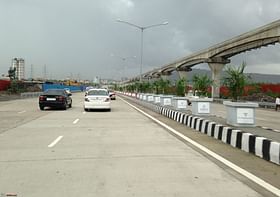The Context : As part of its effort to get Mumbai rid of its pathetic potholed roads, the Brihanmumbai Municipal Corporation (BMC) has finalized five big construction firms experienced in national highway construction to execute the 397-km Cement Concrete (CC) road work.
Swarajya explains the mega-tender project and why the BMC selected companies with expertise in major road infra projects and weeded out small road contractors.
What is unique about Mumbai Roads?
The bad condition of roads in Mumbai is due to the legacy of North-South orientation of city traffic, poor condition of roads and availability of little space for expanding and improving the roads.
Moreover, the state of city’s roads becomes even worse during the monsoon rains when rains play havoc with life in Mumbai. The heavy continuous rain deteriorates road surface – particularly, of the bitumen road which most of the city roads are made of – and leads to development of pot holes and deteriorated pavement.
The problem is compounded by a multitude of agencies tasked with the up-keep and maintenance of roads – 15 agencies including BMC, Metropolitan Region Development Authority (MMRDA), Maharashtra State Road Development Corporation (MSRDC) and State PWD among others manage these roads.
Why the need for concretisation?
A major chunk of roads in the city is black topped except certain stretches which are concretised. Both are the same, but the only difference is the binding material. Asphalt is binding in a bitumen road (black top), while cement is binding in a concrete road.
Due to extreme heat, the tar/asphalt melts and opens the aggregates, leading to pothole formation. Also, water and asphalt cannot stay together and eventually give rise to potholes.
Compared to this, concrete roads do not develop any potholes. In case of concrete roads, once the road is open to traffic after 14 -21 days, the heat does not have any effect and also water does not impact the concrete road structure.
Further, concrete roads being pothole-resistant doesn’t require period surfacing. These roads can also easily bear the weight of heavy vehicles and have a life of at least 30 years, compared to a 5-year life span for tar roads.
With the kind of rain that the city faces, concretisation of roads is the only solution towards mitigating potholes in Mumbai.
Has any attempt been made to concretise the roads in Mumbai ?
According to the BMC, the city has a road network of 2,055 km of which cement concretisation of the roads to the extent of 990 kms has been completed.
Concretisation is underway on another 265 km of roads and work orders are in the process for 397 km of roads. The balance length of 398 Kms is likely to be tendered by March 2023 as part of Phase – II of the project.
The BMC has assured the Bombay High Court that it will complete the cement concreting of the roads under its jurisdiction within a period of 30 months starting from September 2022.
What about the latest tender?
In August 2022, the BMC had started the tendering process for concretising the city’s roads and had called it a ”huge step” towards making them pothole-free in the next two years. As part of this, the civic body invited five tenders worth Rs 5,806 crore for concretising 397 km of roads.
However, the tenders were scrapped in the first week of November citing poor response from bidders. Within three weeks, a fresh tender was floated for the works at a cost of Rs 6,097 crore – a 20 per cent higher rate.
While Rs 1233 crore will be spent on concretising 72 km of road network in the island city, Rs 846 crore would be spent on 71 km road network in the Eastern Suburbs and Rs 4,000 crore would be spent on concreting 254 km roads in the Western suburbs.
Which players are in the fray to execute the project?
The BMC said that it received good responses for all five tenders from “companies of great repute” with 16 firms bidding to cement-concrete roads in the island city.
The two-year road concreting mega-contract is expected to be awarded to five big construction firms experienced in national highways – Nagarjuna Construction Company, Eagle Infra India, Roadways Solutions India, Megha Engineers & Infrastructure and Dineshchandra Agrawal Infracon.
The work order is expected to be issued in the next three weeks, post which work can start.
According to a statement by BMC, most of the bidders have a turnover of more than 1000 crores and public listed companies in infrastructure.
What is the latest controversy surrounding the project?
Former minister Aditya Thackeray on Monday (16 Jan) wrote a letter to BMC chief Iqbal Singh Chahal, raising questions over the civic body’s mega road contracts.
While demanding that the tender should be scrapped, Aditya in his letter asked 10 questions on the project.
The questions pertain to availability of funds, timeline of the project, cost escalation, criteria of “national experience” for the bidders and alleged cartelization by contractors.
Why has BMC gone national for selecting the contractors?
The move to keep out small, fly-by night contractors and appoint contractors with national experience in its biggest-ever civic contract has generated controversy.
However, the BMC in its defense has said that the tender focused on the quality of roads which made entry conditions stringent.
The Mumbai civic body allowed only those players who had carried out work on major vehicular bridges/ flyovers/ state highways /national highways to bid for the mega tender. The BMC has argued that this was done to elicit response from firms with experienced manpower, advanced machinery resources and technical expertise.
Further, the BMC had prohibited tenders from joint ventures in which many small companies work together. The BMC noted that this was done because the quality of roads worked on by such companies had been called into question by citizens.


